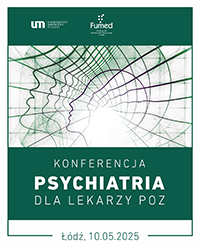Aripiprazole – therapeutic efficacy and safety in everyday practice
Karina Nowakowska1, Jakub Kaźmierski2
 Affiliacja i adres do korespondencji
Affiliacja i adres do korespondencjiAripiprazole differs from other antipsychotics in its unique mechanism of action: as a partial D2 and 5-HT1A agonist and a 5-HT2A antagonist, it acts as a dopamine system stabiliser. The drug allows controlling positive, negative and cognitive symptoms of schizophrenia. The indications in the summary of product characteristics also include treatment of up to 12 weeks of mild-tosevere manic episodes in type 1 bipolar affective disorder in adults and adolescents aged ≥13 years as well as prevention of new manic episodes in adults who experienced predominantly manic episodes and responded to aripiprazole treatment. Clinical trials have shown that the drug is well-tolerated compared to other neuroleptics. Aripiprazole therapy involves a relatively low risk of extrapyramidal symptoms and does not increase the risk of metabolic syndrome. Case reports where combining aripiprazole with another neuroleptic reduced sedation, hypersomnia, drooling, weight gain, dyslipidaemia and sexual dysfunction may be found in literature. Since the drug is available in different forms, it may be also used in agitated, catatonic or persistently uncooperative patients as well as in patients with swallowing problems.






















